- Home
- Joy Dettman
One Sunday Page 3
One Sunday Read online
Page 3
‘Will you show me where it is before you go?’
Feeling like one of those knights in shining armour who spend their spare time saving damsels in distress, he led the way down the side of the station, turned the tap on, then stepped back to watch her stoop low and drink from the spout, filling her cupped hands with water to trickle over her shoulders and down her back. She did the same down her front, which gave him the serious creeping goosebumps. She might have been tiny, but she was big enough in front to make him imagine what that water was trickling around.
‘Helen won’t drink from taps,’ she said, wiping her face with the back of her hand. ‘She swears she swallowed a tadpole one day.’
‘Billy O’Brien reckons he swallowed a frog. I s’pose a small one could come through those pipes.’
‘I suppose it could, but surely they’d have a strainer, or something to stop them getting through, wouldn’t they?’
‘A charcoal filter, someone said.’ It was weird standing there, talking about something like that to her, the moonlight shining on her hair, making it look silver, and making her face look so small, like a sad, lost little girl’s. When most girls got married, they looked happy for a while. She’d looked a lot happier before she’d married.
‘Are you going to go home now, Mrs Kennedy?’
‘You used to call me Rachael,’ she said.
‘That was before you were married.’ He needed a drink. Those goosebumps were working their way down, so he squatted, drinking long at the tap, his mouth making love to the place where her mouth had been.
‘You go to church every week, Mike?’ she said.
‘Only because Mum makes me go with her.’
‘But you believe in God?’
‘Yeah . . . sort of . . . I s’pose I do.’
‘Do you believe that He’s really up there, peering at me from behind that moon, and saying, “For richer, for poorer, for better, for worse, Rachael”?’
‘Father Ryan isn’t. That’s the main thing,’ Mike said, standing, wiping his face.
She giggled, so he laughed with her. Anyway, she was only five years older than him – and her shadow on that wall looked years younger. He edged his shadow closer, then she closed the gap – with her shadow, not her body – and there they were, two dark bodies canoodling on the wall.
‘So, if an opportunity presents itself, and Father Ryan isn’t watching, then maybe we look on certain opportunities as God-given, and it’s up to us to accept them. Is that right?’
‘Pretty much. Yeah. That’s what I reckon – about most things.’
‘Me too,’ she said, and she walked back to the waiting room and sat down. He walked behind her, sat a bit up from her. This was his God-given opportunity and he was accepting it. She wasn’t telling him to go home, and his mother hadn’t noticed he was missing.
‘If I’d been five minutes earlier, I would have been in Willama now, sleeping in a bed at the Stockman’s Hotel. I missed tonight’s train by a whisker.’
‘It came in early, that’s why. It wasn’t even half past ten.’
‘I thought so. It’s never early – except on the one night when I don’t want it to be,’ she said. ‘I should have allowed for that. Helen would have checked the time twenty times then allowed an extra half-hour, just for emergencies.’
Mike didn’t like Helen Squire, didn’t want to bring her stuck-up sulky face into this magic moment, so he made no comment, hoping Rachael would get the message – which she did. She spat on her ring finger and tried to take her wedding ring off!
‘Mum reckons it’s bad luck to take off your wedding ring.’
‘It’s bad luck putting them on sometimes. It won’t come off, anyway. They made certain it was tight enough to choke me.’
‘Irene got Mum’s off with soap. She said it was stopping the circulation of her blood. She said that seeing as Dad was already dead, Mum had had her share of bad luck.’
‘Look, no soap,’ Rachael said.
‘Yes there is.’ There was a dried-out flaky old bar on the tank stand near the stink-boxes. Mike nicked back to the garden, found the soap, wet it, worked up a good lather, then ran with it to the waiting room. She actually touched his hand when she took that old bar of soap.
They were close now, she sitting on the bench seat, he standing over her, breathing in the scent of old soap and new woman, and feeling that goosebump feeling that was halfway between delicious and sinful – and that he wasn’t going to confess, even if his mother shoved him headfirst into the confessional and held him in there with her boot.
‘My fingers are swollen. It won’t go over my knuckle,’ she said. ‘If I could I’d bite it off, I’d spit it at him tonight.’
He couldn’t ask why, or why she’d had to go and marry Gimpy Kennedy in the first place. He watched her struggle, wanting to see that ring slide off her finger. He jiggled his feet, thinking to offer his help but too scared to do it. He got feelings about things sometimes, like some inner power, when he knew he could do something, even if everyone said that it couldn’t be done. He knew he’d get that ring off – if she’d let him.
He coughed, needing to clear his throat and get some air in. ‘Would…would you like me to have a go at it for you? I can get jar tops off for Mum when she can’t.’
And she offered her hand – a little girl’s hand, half as big as his own. He rubbed more soap on, slowly, then asked her to spit on the ring again – because he liked watching her do it. His hands wiped dry on his trousers, his entire body weak but beating like a drum, he took her wrist in one hand and the ring in the other, pulled and twisted it at the same time, and the ring shot off and flew to the floor.
She yelped, jumped up, kissed her bare finger, then took his face between both hands, reached up and gave him a kiss, a quick one, but a real kiss on the mouth, his first-ever kiss on the mouth. ‘You’re my hero, Michael Murphy,’ she said. ‘I thought I’d have to get it cut off in Melbourne.’
‘Holy-moley!’ He grabbed for his pocket, trying to stop what was going on in there from going on, and his hand came out holding a bent cigarette and a box of matches. Then he was down on his knees, his tongue licking his lips, licking that kiss and taking it inside him to keep forever while he struck matches. She didn’t know what was going on with him. She thought he was looking for the ring.
‘I don’t want it, Mike. I’m not married to him – not really married.’ She sighed then, walked to the doorway. ‘You know, you spend half of your life saying to yourself, “what if”, and whatever “if” you are expecting never happens, and the one you are least expecting always does, and when you are least expecting it. I thought you and your friends had gone home. That’s why I came in from the garden, but there you were.’
Every word she said was making things worse for him. He crouched on that floor, using six slow burning matches before he found that ring – which he could have found with his first match.
‘It’s nothing,’ she said, jiggling it on her open palm. ‘It’s metal.’ She took it between finger and thumb. ‘As if blessing that bit of metal can suddenly give it some sort of power over me. It has no power, unless I give it power.’
‘Do you know what my mum said to Irene when we heard that you’d got married to Gimpy Kennedy? She said that God should have waved a burning bush on the steps of the church and stopped a nice kid like you from ruining your life.’
‘I wasn’t married in church, Mike, but he could have turned this ring into a viper, just as Dave was putting it on my finger – then it might have bitten him instead of poisoning me.’ She walked out to the platform and stood looking down at the lines. ‘Chris and I put a ha’penny on those rails one night and flattened it. I’ve still got it in my bag,’ she said, walking down the ramp to the lines, where she placed the ring.
‘It will probably jiggle off.’
‘No it won’t. It will get squashed flat, chewed up and spat out, and one day Mr Wilson will be crossing over these lines and he’ll see
gold.’
‘And start another gold rush,’ Mike said. Again she laughed her cute little giggle, so he laughed softly with her.
They walked between those lines then, his moon shadow touching hers. They walked west to where the dairy paddocks started, and the old carthorse wandered over to the fence for a pat.
‘I wish I had something to give him. I love horses. Helen is scared stiff of them.’
Sulky-faced Helen Squire interfering with his fantasy again. He didn’t want her here. ‘She’s scared of everything,’ he said. ‘At church one day I showed her the wriggling tail of a drop-tail lizard and she screamed blue murder and Father Ryan nearly twisted my ear off.’
‘She’s just shy.’
‘She’s just stuck-up – like I’m not even good enough to talk to.’
‘House rules,’ Rachael said, and walked on. ‘The people you live with make you into who you become. That’s why I’m leaving, so I don’t have to become who I’m not. When I was little, my home was the most perfect place in the entire world, Mike. Always Artie and Freddy and their friends there, always lots of people and parties. Heli was born just before the war so she missed out on knowing Artie and Freddy. That’s why she’s shy, but she’s the best, the most honest person I know. I was supposed to set her a good example, and I set her a very bad one. Tonight I’m trying to rectify that.’
‘Mike! Are you getting up to no good out there somewhere?’ a voice called in the darkness.
‘That’s my brother. Mum’s found out I’m not in bed,’ Mike said.
‘Thanks for getting that ring off, and for keeping me company. Don’t tell anyone you saw me – or not until after the train leaves in the morning. Then you can tell Miss Lizzie, and she can tell the whole town if she wants to.’
‘I won’t tell – but anyone looking out their window would see you in that dress.’
‘They’re all asleep except you and me, Mike.’
He didn’t want to leave her, but his mother was yelling now. ‘Mr Wilson starts work early,’ he said. ‘He’s got crates of fruit to be loaded in the morning.’
‘Michael, my lad. If you don’t get yourself home right now –’
‘I’d better go.’
‘Thanks for your strong hands.’
‘I’ll have a look for that ring tomorrow, and if it jiggles off, I’ll stick it back on for you – with some mud. Good night, then . . . Rachael.’
‘Sleep tight, my hero.’ She made a curtsy, waved her hand, and Mike ran over the road and up Station Street.
the darkest hours
Sunday, 2.45 am
They’d dressed the wound, bound her foot and a few of the deeper lacerations. Her pulse was still struggling on, though for how much longer it would continue the struggle, they didn’t know. No gain in moving her, so they left her in peace.
It was after three before the swabs were counted, the surgery cleaned and the infant examined. He weighed in at four pound nine ounces.
‘He’s small, but he’s a survivor,’ Irene said.
Joan nodded. ‘He’s all Johnson. Could be close to term by the look of that hair.’
At 3.14 am his birth was duly recorded: Mother’s name: Ruby Florence Johnson. Date of birth: 14 November 1913. Father’s name:… That space was left vacant for the moment, and may God have mercy on him if they ever wrote his name there.
‘She’s barely fifteen years old. The boy will be charged with statutory rape.’
‘I doubt he’s got a lot to worry about, love. She’s not going to make it through to dawn,’ Rob said.
‘I doubt she’ll want to if Sarah O’Brien has been flapping her lip to everyone,’ Irene said.
‘I don’t understand why the parents aren’t here.’
‘Willie wouldn’t have told them, Mrs Hunter. They’re not speaking to him since he left Squire’s and went to work at the dairy.’ Irene knew the Johnson family well. They went to the same church.
‘They’ve got to be told,’ Rob said, looking at the clock. ‘I’ll have to put a call through to Squire. He’s not going to appreciate playing messenger boy in the middle of the night.’
‘But you’ll enjoy waking up Miss Lizzie,’ Joan said.
The twin glass doors of Rob’s consulting room opened out to the north veranda where the hurricane lantern, hanging from a rafter, cast its weak yellow light. Five minutes later, Rob placed a cigarette between his lips and opened those doors, lifted the lantern’s glass shade to borrow a light, then drew the smoke deep as Joan joined him.
‘That was fast.’
‘She couldn’t wake them. I’ll try again later.’ He walked around the corner to a set of granite steps at the front of the building, where he sat staring across at the Catholic church. Joan sat beside him, freeing her corkscrew curls from the white veil, her fingers massaging her scalp and setting those curls dancing.
‘That poor little girl,’ she said.
‘How long has she been in Melbourne, love?’
‘Since August. That infant would have been well on the way, Robbie.’
‘No doubt their reason for getting her out of town.’
‘I heard she was working down there as a lady’s maid.’
It was pleasant on those stone steps, cool air wafting off the shrubbery and lawn surrounding the building, air that had spent the day in the shade and beneath the floors now venturing out to play. Dawn’s sun wasn’t too far away, though.
Rob sucked the last from the butt, extinguished it on the step, then the couple stood and walked back the way they’d come.
A large family home with wide verandas on four sides, the Hunters had bought it thirty-five years ago, hoping to fill it with their own children. With that dream never realised, they’d set up their house as a lying-in hospital. There had been more laying out than lying-in done in their wards, many women still preferring to give birth at home, although since the war a few of the younger mothers were demanding the hospital, where a whiff of chloroform was available if things became desperate.
They walked past the lantern where moths flew in circles, mesmerised by the flickering flame. In the morning dead moths would litter the floor. There was no light to guide them on the rear veranda; aged trees cast long shadows there, allowing little moonlight through – or sun on hot afternoons.
The screen door to their private entrance was a niggly pest of a thing they kept meaning to replace. It slammed behind Rob, always trying for his heels, but he knew the door well and dodged its bite.
Three rooms were left for them: the kitchen, a dining-cum-sitting room and the bedroom – big rooms, extravagant rooms in their day, though that day had been fifty years ago. It showed in the furnishings, the rugs on the floors, the paper on the walls. A timeless sanctuary this end of the house, only a long wide passage and twin wooden doors separated dusty peace from the ward’s white sterility.
They’d managed a couple of hours’ sleep before Ruby was brought in. Now they returned to their bed, and neither the heat and howling dogs, nor the rooster next door and the early birds in the trees outside their window, could keep them from their dreams.
On the other side of Willama Road, Tom Thompson too was sleeping.
Across the river, Helen Squire’s lamp flickered and died. She didn’t like the dark, so she turned to the window and began counting backwards from one thousand.
molliston
Just another one-pub country town, Molliston was one of those accidental towns with nothing to distinguish it from every other one-pub country town in Victoria, apart from the fact that most of it was built in a circle around a massive red gum tree standing near the top of a slope that wasn’t quite a hill. That tree would have been old when Captain Cook was still in short pants. There was no good reason why it remained, other than its size: it was too large to fell when the stone axe made way for steel in Australia, although a lot of smaller trees had been taken down to make way for a fifty mile track between Willama and the Merton gold fields.
They
’d come on foot for that gold, come pushing wheelbarrows, come on horseback and in covered wagons, making camp for the night at the halfway point, beneath that old gum tree. Friendships and partnerships had been forged there, tales of gold strikes told around camp fires. One chap picked up a nugget the size of his fist while washing his face in Merton Creek. A barefoot kid stubbed his toe on a rock, and when he looked down to curse that rock, there it was, a lump of gold as big as his foot.
They’d passed by that tree in their hundreds, erecting a tent and bark hut city twenty-five miles east, alongside Merton Creek. There’d been gold for the taking at those diggings. She’d be bigger than Ballarat, the newspapers of the time reported.
That gold had to be brought out, the diggers had to eat. Bullock teams bringing supplies across from Willama turned that fifty-mile track into a bog during the wet, so they cut down a few more trees and widened the bog. Within two years of that first gold strike, a town sprang up and gold-rich Merton was marked on every map. The road makers came then. They turned that fifty mile bog into a road fit for the passenger coaches, which had already been providing a daily service between Bourke Street, Melbourne, and Willama. A hard-driven coach horse could do twenty-odd miles before needing a rest, and those coaches, having no time to wait around while the horses rested, required fresh teams every twenty miles. All along the coach routes, small hostelries were established.
That hill and the old gum tree had always been the halfway point between Willama and Merton. To the east of that tree, a mile or so nearer to Merton, the land levelled out before rising again. It looked like old England in the spring when a small stream, fed by the runoff from the hill, trickled through fields of grass taller than a man’s waist. That’s where the coach company built their hostelry.

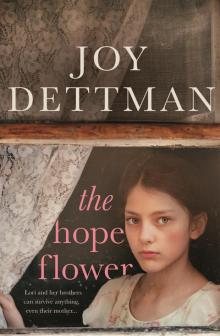 The Hope Flower
The Hope Flower Trails in the Dust
Trails in the Dust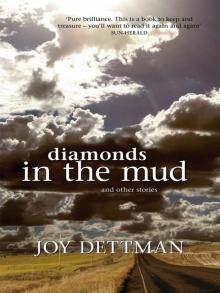 Diamonds in the Mud and Other Stories
Diamonds in the Mud and Other Stories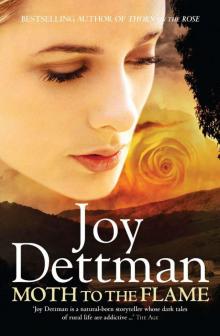 Moth to the Flame
Moth to the Flame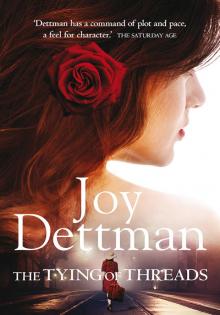 The Tying of Threads
The Tying of Threads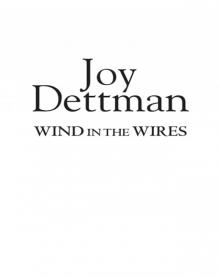 Wind in the Wires
Wind in the Wires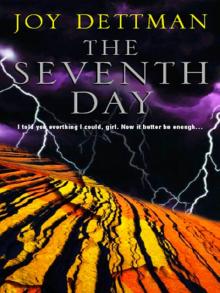 The Seventh Day
The Seventh Day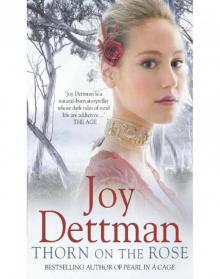 Thorn on the Rose
Thorn on the Rose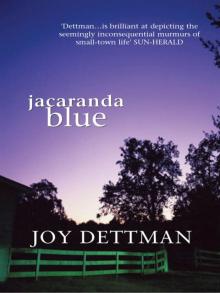 Jacaranda Blue
Jacaranda Blue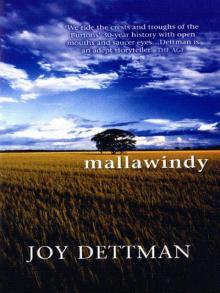 Mallawindy
Mallawindy Ripples on a Pond
Ripples on a Pond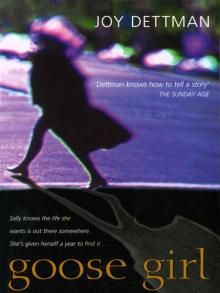 Goose Girl
Goose Girl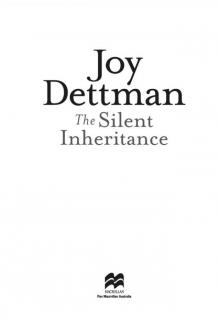 The Silent Inheritance
The Silent Inheritance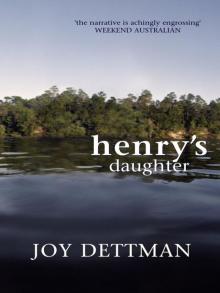 Henry’s Daughter
Henry’s Daughter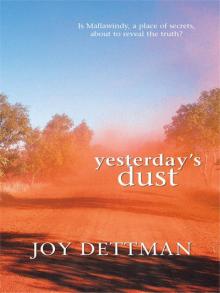 Yesterday's Dust
Yesterday's Dust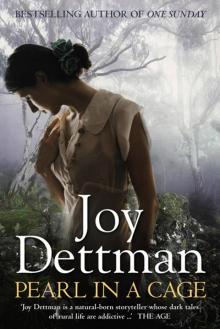 Pearl in a Cage
Pearl in a Cage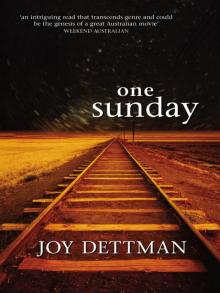 One Sunday
One Sunday